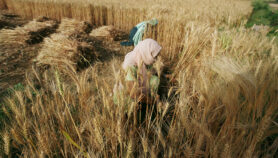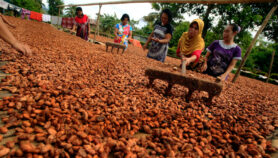By: Shahani Singh
Send to a friend
The details you provide on this page will not be used to send unsolicited email, and will not be sold to a 3rd party. See privacy policy.
[KATHMANDU] The Nepal government’s efforts to promote safe and minimal use of pesticides in the country now include an effective training programme for vendors and others who deal with farmers.
The training curriculum, approved in January, covers capacity development for secure sales, distribution, storage and usage of pesticides. This follows reports appearing in newspapers on pesticide misuse in 2014.
A study, published in the Annals of Plant Protection Sciences in September 2014, showed vendors in the districts of Dhading in the west, Kavre in the east and Bara in the south of Nepal having inadequate technical knowledge of pesticides.
Farmers were found exposing themselves to toxic pesticides by not following basic handling guidelines, and study showed 44 per cent of farmers interviewed storing pesticides in their homes — in living rooms, under staircases and even in bedrooms.
Customers were also being exposed to pesticide residue from failure to observe the required ‘waiting period’ between spraying and harvesting.
A new laboratory set up to address pesticide exposure to consumers awaits equipment and trained professionals.
Dilli Ram Sharma, programme director at Nepal’s department of agriculture, says that vendors frequently flout basic norms requiring storage of pesticides in glass cabinets. “Our laws say we cannot store pesticides in the open, but vendors seldom follow such instructions," says Sharma.
Sharma’s training programme for vendors covers laws and regulations, WHO classifications, commercial terminology, environmental and health impacts, field research on retail practices, impact on crop-friendly insects and expiration dates of pesticides.
"We are planning to hold refresher courses every two or three years to build capacity,” Sharma says.
Along with ICTs for agriculture, vendors will play a major role in Nepal in the next decade, says Sulav Paudel, coordinator of the USAID-funded Integrated Pest Management Innovation Lab Programme in Nepal.
"It is almost impossible to train all farmers in Nepal, but we can reach a large number of them through vendors," Paudel tells SciDev.Net.
Paudel believes in regular and continuous training because of new chemicals constantly entering the market. "Vendors should have a deep and broad knowledge of the kind of products they are selling — they are dealing with chemicals which when mishandled can take lives."
> Link to the Annals of Plant Protection Sciences study














